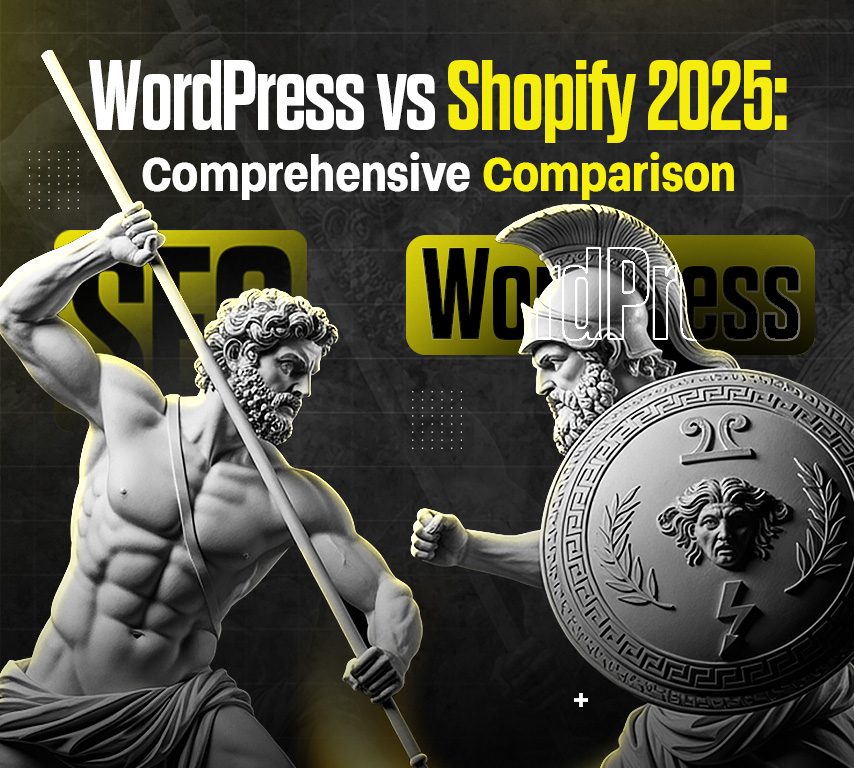
In 2025, the e-commerce landscape is more competitive than ever and choosing the right platform can make or break your online business. Two platforms dominate the conversation: WordPress (with WooCommerce) and Shopify. Each has its strengths, weaknesses, and ideal use cases.
At Expandeum, we’ve worked with both platforms extensively helping businesses build scalable, SEO-friendly, and high-performing stores. This guide provides a comprehensive comparison of WordPress vs Shopify in 2025, focusing on ease of use, customization, SEO, pricing, security, scalability, and migration.
WordPress + WooCommerce: The open-source option, offering unlimited customization, thousands of plugins, and deep SEO control. Perfect for businesses that need flexibility and unique features.
Shopify: A fully hosted platform with built-in hosting, security, and support. It’s designed for simplicity and speed, making it a great option for entrepreneurs who want a store that “just works.”
59,000+ plugins and thousands of themes.
Full control over code and design.
Ideal for membership sites, marketplaces, or advanced features.
8,000+ apps available.
Sleek templates, but checkout customization is limited unless you’re on Shopify Plus.
Great for clean, reliable stores without heavy customization needs.
Verdict: WordPress wins for businesses that want unlimited customization.
At Expandeum, we frequently build custom WordPress integrations and help Shopify clients optimize their apps for performance and ROI.
Basic: $39/month
Shopify: $105/month
Advanced: $399/month
Shopify Plus: $2,000+/month
Extra costs: Paid apps, premium themes, and transaction fees (if not using Shopify Payments).
Hosting: $10–50/month
Domain & SSL: $20–100/year
Themes: $50–100 one-time
Plugins: Free–$200/year each
Developer support: Varies
Insight: Shopify costs more long-term due to app subscriptions. WordPress can be cheaper but requires ongoing management. Expandeum helps client’s budget effectively for both options.
Industry leader for SEO flexibility.
Plugins like Yoast SEO and Rank Math allow deep optimization.
Great for businesses investing in SEO optimization services and content marketing.
Improved SEO features in 2025.
Easier to manage but less control over URL structures.
Expandeum provides Shopify SEO services to help stores maximize visibility.
Fast, reliable hosting included.
Depends on hosting; can outperform Shopify with proper optimization.
PCI compliant, SSL included, automatic updates.
Requires manual management of plugins, themes, and firewalls. Expandeum ensures WordPress clients remain secure through ongoing monitoring and updates.
Scales effortlessly from small stores to global enterprises.
Shopify Plus is a favorite among big brands for its performance under high traffic.
Infinitely scalable with cloud hosting, caching, and CDNs.
Requires technical expertise for smooth scaling.
Expandeum specializes in scaling WordPress stores for businesses ready to expand.
Verdict: Shopify handles scaling automatically. WordPress needs expert management but offers unmatched flexibility.
Factor | Shopify | WordPress (Woo Commerce) |
Ease of Use | Beginner-friendly | Steeper learning curve |
Customization | Limited | Unlimited |
SEO | Strong | Excellent |
Pricing | Predictable | Flexible but variable |
Security | Fully managed | Requires active management |
Scability | Automatic | Requires expertise |
Best Fit | Fast launches, simplicity | Custom stores, SEO-focused growth |
Switching platforms is common as businesses grow:
From Shopify to WordPress: Businesses often migrate when they need more customization and SEO flexibility.
From WordPress to Shopify: Some migrate when they want to reduce maintenance and simplify operations.
Expandeum provides migration services to ensure a smooth transition between the two platforms, without losing products, customer data, or SEO rankings.
WordPress still leads for SEO flexibility, but Shopify has caught up significantly.
Yes. Expandeum handles migrations to ensure no data loss and smooth transitions.
Shopify is secure by default. WordPress is secure if updated and maintained correctly.
WordPress can be cost-effective but needs technical upkeep. Shopify costs more but offers convenience.
Shopify scales out-of-the-box. WordPress scales too but requires expert setup and monitoring.
The answer depends on your business priorities:
Choose Shopify if you want simplicity, speed, and minimal maintenance.
Choose WordPress if you value customization, SEO dominance, and long-term flexibility.
At the end of the day, both platforms are powerful. What matters most is how you set them up, optimize them, and align them with your growth strategy.
That’s where Expandeum comes in: delivering SEO optimization, Shopify SEO services, migration solutions, and e-commerce growth strategies that ensure whichever platform you choose works for your success.